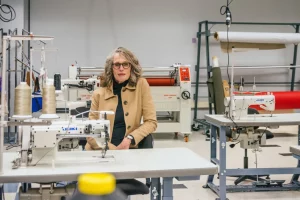Women often struggle to break into the fashion industry due to a lack of access to financing and expertise, MWF President and Chief Executive Officer Carolyn Cassin said. The new program will pair ISAIC’s industry knowledge with MWF’s expertise in starting and growing a business.
“This is a match made in heaven we both have skills and ability,” Cassin said. “We thought if we work together, we could launch more (fashion) businesses.”
The William Davidson Foundation is supporting the pilot program with a $50,000 grant.
The grant will pay for the entrepreneurs to participate in basic industrial sewing and business education programs with both ISAIC and MWF and also provide them with a $1,500 stipend for entrepreneurs stepping away from their fledgling businesses or other jobs to take part in the program.
Participants in one of four, seven-week cohorts will go through ISAIC’s “Fundamentals of Industrial Sewing and Production” curriculum addressing the fundamentals entrepreneurs need to take their product to manufacturing.
They’ll also take part in a one-day workshop covering the basics of owning their own fashion business and providing a road map for the steps they need to take to prepare.
“We can provide technical assistance and guidance on where to take their business, but we’re not here to provide financial information or training” and don’t have the resources MWF has, said Ann Fitzpatrick, communications consultant to ISAIC.
After entrepreneurs complete the educational programs offered by ISAIC, MWF will take it from there, providing the entrepreneurs with basic business education. They’ll learn things like cash projection and other financial knowledge needed to become a competent business owner, Cassin said.
At the end of the program, the fashion startups will be eligible for low-fee microloans of $5,000-$50,000 from MWF to help launch their businesses.
“We think it will take six weeks to three months to get these businesses up and running,” Cassin said.
Applications for the first cohort of “Fashion Forward: Advancing Entrepreneurs” are due by April 15.
The pilot could serve as a model to grow women-owned businesses in other industries, Cassin said.
“If you think about it, what prohibits women from getting their business out of their kitchen?” she said. “Just because they make a mean cookie doesn’t mean they know enough about the food production or distribution system.”
If the pilot can help propel the launch and growth of local fashion brands “we’re going to do it again and again and… use it as a model with other industries like food businesses (and) health and beauty,” Cassin said.
View the original article.

